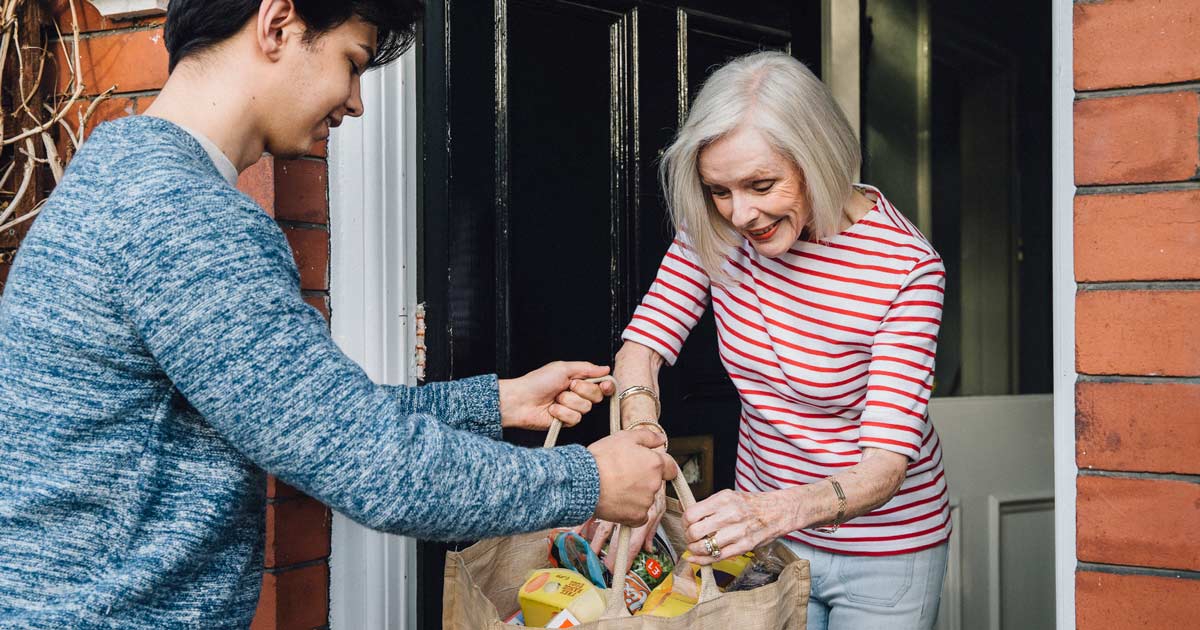Even the most meticulous list maker may find themselves low on staple groceries at some point during the COVID-19 pandemic, requiring them to shop for more. For those in the 65+ age group, this is especially serious due to the higher risk of infection attributed to them. According to the Centers for Disease Control and Prevention, “8 out of 10 deaths reported in the U.S. have been in adults 65 years and older,” so vigilance is mandatory. Before going shopping, follow these steps to minimize the chances of infection while shopping.
Step 1) Shop online and have groceries delivered.
This is the best way to minimize risk although it doesn’t eliminate it because another human being has to fill your bags and deliver them. But it is much better than going yourself. Many large chains already deliver in certain markets, most using fee-based delivery services like Instacart, Postmates, Envoy, and Shipt, including Target, Whole Foods, Kroger, and Trader Joe’s. Other’s like Safeway and Costco provide the service in-house. The Spoon University article “9 Grocery Stores That Will Deliver Food to Your Doorstep” is a good place to start. Or just call your favorite store and ask how it works and how long delivery takes. You may need to download an app to complete the process, but it’s definitely worthwhile.
Step 2) Ask someone younger do your shopping for you.
A friend, relative or neighbor may already be going shopping and be happy to assist you.
Step 3) Get prepared to go it alone.
The less time it takes to shop, the less chance of becoming infected while there. So thoroughly research what you need and how much is enough and make a concise list. If possible, check online to make sure the products you want are in stock as many items like disinfectants may be sold out.
Also keep in mind that staying healthy requires good nutrition which means lots of fruits and vegetables, canned foods including high protein foods like meats and fish, dried beans, rice and oatmeal, dairy products, and other essentials. The Heavy.com article, “Coronavirus Tips: What to Stock Up On Due to COVID-19 [LIST]” runs the gamut from health and beauty products, paper, medicines, and foods and will help you create a list that is as complete as possible.
Also, check with the store to find out if they have special seniors-only hours and take advantage if they do. Once you know the best time to shop, plan your trip accordingly and be sure to bring along hand sanitizer, your shopping list, and wash your hands before you leave.
Step 4) Follow best practices at the store.
Assume the worst — that everything is potentially covered with germs, because it very well may be. At the entrance, use hand sanitizer and wipes to clean the shopping cart. Next, remember that from farm to shelf requires the intervention of a lot of people around the globe so avoid touching produce with your bare hands. Instead, use a plastic produce bag like a glove and tie the bag off with the produce within.
As you go up and down the aisles, remember to practice social distancing and stay a minimum of 6 feet from other shoppers at all times. Continue to use hand sanitizer as you fill your cart and move around the store and do not touch your face! When checking out, the World Health Organization recommends using a card if possible to avoid giving and receiving cash. For more expert tips, read “Is It Safe To Go To The Grocery Store During The Coronavirus Outbreak?” from the Huffington Post.
Step 5) Follow-up at home.
When you get home, wash all fresh produce first. Next, you can wipe down canned and packaged goods with a sanitizer, although there is not yet any such recommendation from experts. What we do know is that COVID-19 can remain viable on a variety of surfaces so extra cleaning is always a good idea. The National Institutes of Health’s recent news release explains the viruses’ stability as we now know it. If using reusable grocery bags, take the time to sanitize them and wipe them clean of any food residues. When finished, wipe down all counters and wash your hands again.
It’s a different world today and one that requires diligent attention to the rules, respect for others and a lot of common sense. For those who are elderly and have no one to turn to for help shopping or with other chores during the pandemic, contact the nearest community service agency. The U.S. Department of Health and Human Services offers a number of Resources Near You.
For information about Countryside, please call Margaret Nagel at (517) 206-5000 or download our brochure to learn about our care levels, cost, and amenities.


